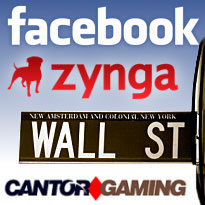 Game developer Zynga saw its stock rise 6% on Friday, closing at $10.05, the first time the stock has topped its $10 IPO price since the day Zynga went public. Market watchers debated whether the rise was due to the company’s announcement of its new Zynga Bingo game’s beta launch, or CEO Mark Pincus’ admission that it was having “active conversations” with potential partners in a real-money online gambling venture. Then again, given that Zynga derives the vast majority of its revenues via Facebook, the stock may have received an extra boost from Friday’s rumor that Facebook could file a prospectus for its own IPO as early as Wednesday (Feb. 1).
Game developer Zynga saw its stock rise 6% on Friday, closing at $10.05, the first time the stock has topped its $10 IPO price since the day Zynga went public. Market watchers debated whether the rise was due to the company’s announcement of its new Zynga Bingo game’s beta launch, or CEO Mark Pincus’ admission that it was having “active conversations” with potential partners in a real-money online gambling venture. Then again, given that Zynga derives the vast majority of its revenues via Facebook, the stock may have received an extra boost from Friday’s rumor that Facebook could file a prospectus for its own IPO as early as Wednesday (Feb. 1).
The Facebook IPO rumors started earlier in the week when the social networking colossus halted trading on private share-trading platform SecondMarket, a traditional sign that public trading was imminent. On Friday, the Wall Street Journal reported that Morgan Stanley was the likely candidate to reap the massive underwriting fees for bringing Facebook to market, with Goldman Sachs playing a supporting role. Facebook is reportedly looking to raise as much as $10b, over five times larger than the current record for a tech IPO held by Google. That would put a valuation on Facebook at somewhere between $75b and $100b. (By comparison, Zynga raised $1b on a valuation of $9b.)
Cantor Entertainment Technology, which controls Nevada sportsbook operator and online poker service provider applicant Cantor Gaming, announced its intention to take itself public before Christmas. In less than three years of existence, Cantor has assumed control of 14% of all Vegas sportsbook action, but that impressive feat hasn’t ensured the company’s profitability. In fact, Cantor Gaming’s loan payments to parent company Cantor Fitzgerald were more than its revenues last year.
Cantor is a relatively new company, so a negative revenue/expenses ratio isn’t uncommon. But the Nevada Gaming Control Board puts Cantor’s hold percentage through the first nine months of 2011 at 2.07%, while the figure for all Las Vegas sportsbooks was 4.49%. (The discrepancy is blamed on Cantor’s willingness to accept sharp bettor action that other books deem too risky.) The company is counting on continued growth to put them in the black, but questions remain as to where this growth will come from (besides the $100m in expected IPO cash). While major casino companies like Caesars Entertainment have spent millions on Washington lobbyists in the hopes of adding a new online poker revenue stream, their online poker hopes and dreams may pale in comparison to the needs of Cantor Gaming.